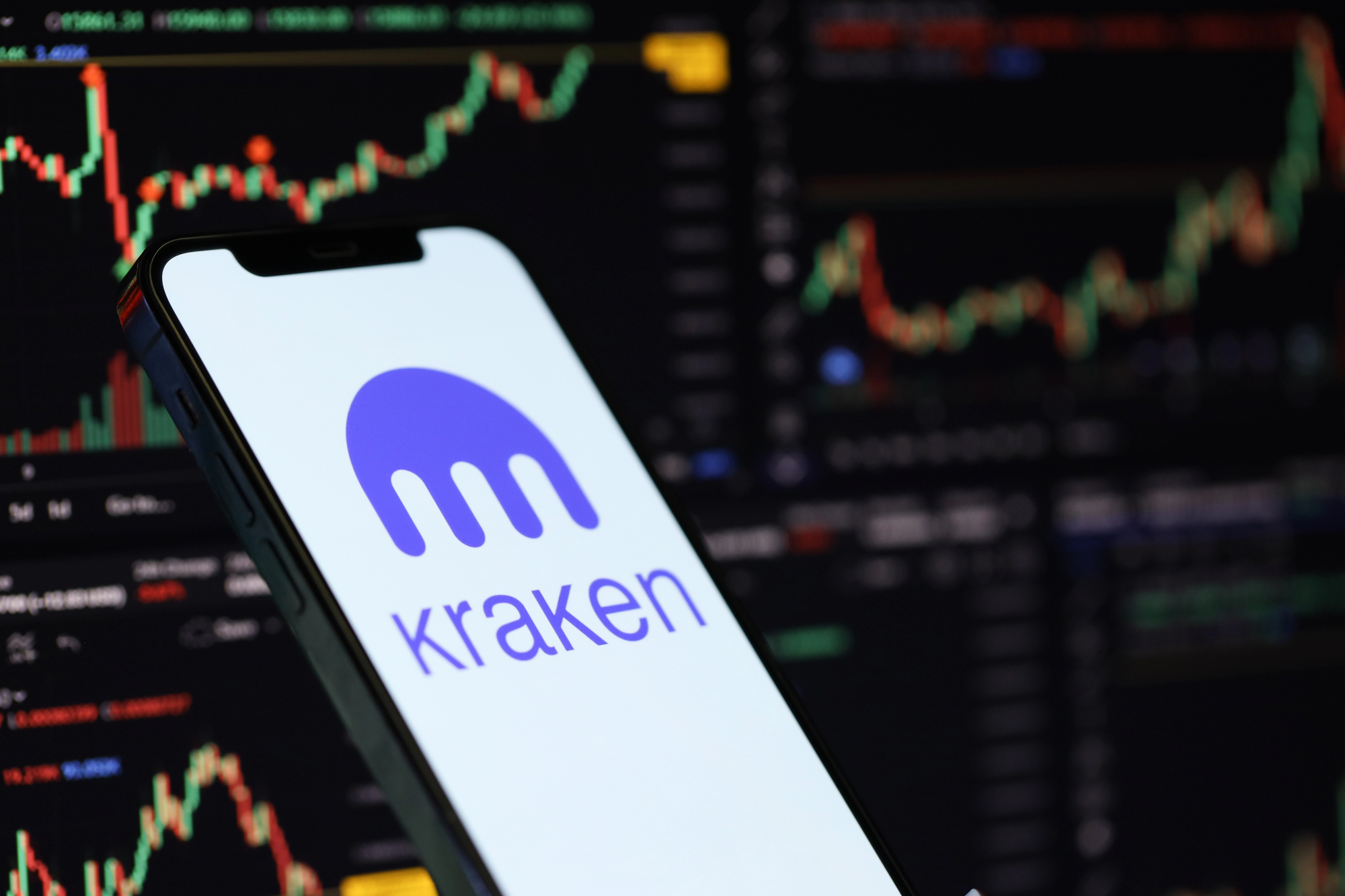To make Wealthtender free for readers, we earn money from advertisers, including financial professionals and firms that pay to be featured. This creates a conflict of interest when we favor their promotion over others. Read our editorial policy and terms of service to learn more. Wealthtender is not a client of these financial services providers.
➡️ Find a Local Advisor | 🎯 Find a Specialist Advisor

Do you work at Kraken? Get the resources you need and expert insights from financial professionals who specialize in helping Kraken employees make the most of their compensation package and benefits.
Whether you’re a new Kraken employee or you’ve moved up the ranks into a management or executive leadership role over a multi-year career, it’s important to make smart money moves with your income and employee benefits. For example:
✅ Do you know the right moves to make to get the greatest value from the Kraken benefits available to you?
✅If you’re thinking about leaving Kraken for another job or planning to retire from the company in a few years, are you taking the right steps today to ensure you will receive all of the compensation and benefits that you’ve earned?
Get the Most Value from Your Kraken Benefits and Compensation Package
Throughout the year, Kraken provides its employees and executives with updates about their benefits ranging from health insurance and health savings plans to retirement plans like a 401(k) and deferred compensation plans. While the company offers many useful resources and access to knowledgeable staff who can assist with questions, you’ll also find financial professionals not affiliated with Kraken who specialize in helping Kraken employees make the most of their income and benefits.
Whether you work in the Kraken headquarters in Cheyenne, Wyoming, or remotely around the country, you may have questions about your compensation package and benefits better suited for a financial professional who can offer unbiased advice and guidance.
For example, sensitive topics like discussing the steps you should take before quitting your job at Kraken to work elsewhere, protecting yourself in advance of a corporate layoff, or deciding when you should plan to retire are all conversations that may be more comfortable with a trusted financial advisor.
Should you hire a Kraken specialist financial advisor or an advisor close to home?
You’ll likely find dozens of nearby financial advisors well-suited to help you reach your money goals with a personalized plan. But it may be more difficult to find a financial advisor who specializes in serving Kraken employees.
Fortunately, many financial advisors offer virtual services so you can meet online no matter where you (or they) live.
This means you can choose to hire a specialist financial advisor who lives hundreds of miles away if you decide their knowledge and experience working with Kraken employees is a better fit to help with your unique needs.
💡 In the Q&A below, you’ll gain insights from financial advisors who work with Kraken employees to help them make smart decisions to get the most value from their compensation and benefits, reduce their money stress, and prepare for a comfortable retirement.
🙋♀️ Do you have questions not yet answered? Use the form below to submit questions anonymously and watch this article for updates with answers to your questions. You can also reach out to the financial advisors below to set up an introductory call or contact them with your questions by email.
💸 Smart Money Insights for Kraken Employees & Executives
This page is organized into sections to help you quickly find the information you need and get answers to your questions:
- Q&A: Financial Planning Tips for Kraken Employees & Executives
- Get Answers to Your Questions About Your Kraken Benefits and Career
- Browse Related Articles
Q&A: Financial Planning Tips for Kraken Employees & Executives
Answers to Kraken Employee Questions with Jim Garvin, CFP®, EA
Jim Garvin is a financial advisor based in Pittsburgh, Pennsylvania who specializes in offering financial planning services to Kraken employees. Jim helps his clients get the most value from their Kraken benefits and compensation package so they can enjoy life and feel confident about their financial future.
Q: As a financial advisor with experience helping Kraken employees save for their retirement, how do you help them make the most of their employee benefits?
Jim: As a financial advisor experienced in working with Kraken employees, I focus on turning their robust benefits package into a clear, actionable financial independence strategy.
Empower 401(k):
This begins with optimizing tax-advantaged accounts like the 401(k) (which is held at Empower), where employees can choose traditional or Roth contributions from the start of their employment. Unfortunately there is no match at this time & no “Mega Roth” ability exists. We still believe this could be a good strategy to employ as it helps provide a tax deduction (up to $23,500 in 2025) to the high income earners of Kraken while also helping build that financial foundation towards retirement.
Stock Options:
Another core consideration here are the stock options & equity that is held at Carta for Krakenites. In fact, if the stars align & all goes well, this could provide the greatest boost in retirement savings & optimization. There is a lot to unpack here, which is why made a Youtube video on this topic. Ultimately, this is a dance between affording the exercise of these options (ISOs or NQSOs), understanding how AMT tax fits into the picture & clarifying the amount of “risk” you want to lean into with the “investment” of exercising options. The goal is to sell these at some multiple in the future, however there is a precarious dance as you actually complete these exercises. It is also possible that future FMV of these shares could be lower or maintain illiquid. There are no guarantees they will be profitable.
To add some additional nuance, that 401(k) item I listed above does affect the AMT results from exercising stock options. Therefore, Krakenites should be mindful of the entire picture when making these financial decisions. Doing the 401(k) does have it’s benefits but it may also affect the AMT tax bill along with eating into cash flow that could be used to exercise these options. Every client’s situation is a bit different so we want to authentically understand which approach is most optimal for them & their family.
Lastly, other optimizations tactics for long term retirement & financial independence planning can break down into the following:
Sidemoon (could be speculative or apart of an overall strategy)
Health Savings account (very tax efficient)
Q: When you first speak with a Kraken employee, what questions do you like to ask to better understand their unique circumstances and determine how you can best help them achieve their goals?
Jim: When I first meet with a Krakenite, our goal is to understand both their financial picture but most importantly the vision they have for their life. Good financial planning is good life planning. I start with a high-level, 30,000 foot view of their finances, the “landscape” of their situation. Then, we dive into their values & what’s most important to them & their family. Painting a picture of both their near to short term milestones but also the longer term vision of the life they want to live.
Often times, we dive into conversations such as:
- Sabbatical planning: What will it take to leave & take a break for a few months or a year?
- Family planning: We want to start a family! or How can we best support our kids as they get older?
- Home: We are looking to buy a home or move homes, what is the long term trade off if we buy a $XX priced home?
- Stock options: What is the most appropriate way to think about & exercise these stock options?
These are only a few of the topics we start to dive into. Our meetings are very open & organic & we flow the conversation into what is most important for the client.
Many of the questions we like to ask our Krakenites include:
- What would you like to lean into in life right now? What is most important for you?
- What are your primary anxiety points financially right now? How can we best support you?
- What will a liquidity event (IPO, etc) from Kraken do for you?
- What does your most fulfilling life look like? How do you want to spend your time, your days & your weeks?
- What does success (both financially but also life success) look like to you?
- What do you do for fun?! What are your favorite hobbies that bring you genuine joy?
- What are some of your priorities over the next few years?:
These are only a small snapshot of some of my favorite questions. We like to ask many more open ended questions during our relationship with our clients. Once we understand genuinely what are the priorities & most important values of our clients, we can start crafting a technical financial path which will include the tactics of financial planning.
Q: Is there a particular benefit available to Kraken employees you feel isn’t as well utilized or understood by employees as it should be?
Jim: Stock Options:
Inherently these are pretty complicated & can be stressful, especially on the ISO (Incentive Stock Option) & AMT side. Here is a Youtube video in which we covered the basics of this topic. Often times what we see is that a client may feel overwhelmed & decide not to exercise any stock options until the IPO or right beforehand. This is alright & is a strategy on it’s own, however it could also produce some future stress & tax inefficiencies. On the flip side, we have seen clients get to excited & exercise to many stock options all at once, resulting in a very stressful AMT tax bill.
As both a financial planning & tax firm, we provide thorough guidance when it comes to tax & stock option strategy. What we find helpful here is to understand the trade off of “if I exercise XX number of options, the AMT tax is $XX”. This better allows for scenarios to built were the Krakenite can understand their true investment into Kraken shares & what that outcome may look like. Remember, the “true” cost = strike price x number of options + AMT tax. Now, there may be an AMT credit that is generated which may also come into consideration. Lastly is the risk element, there is no guarantee the stock can be sold at a healthy multiple or profit.
Health Savings Account:
One benefit I often see underutilized is Kraken’s Health Savings Account (HSA) for employees on the High Deductible Health Plan. The HSA isn’t just a way to pay for today’s healthcare costs, it’s a triple tax-advantaged investment account that can be grown and could be used tax-free in retirement. Because Kraken contributes up to $2,000 annually for family coverage, employees have a head start, but many only fund it enough to cover current-year expenses instead of maximizing contributions and investing the balance for long-term growth. The max contribution in 2025 is $4,300 single & $8,550 family. A strategy we sometimes employ is to use this HSA to invest for the long term, so you can grow your wealth in a more tax efficient manner & then use this to pay for healthcare costs in your 60s or 70s. This way, the investments inside the account will grow tax-free when used for future healthcare costs (which statistically, is some of the highest spending we may all have in retirement)
Sidemoon:
This is a fun little “wild card” benefit offered by Kraken! The way it works is that your income will flow through your paystub but then be directly deposited into a Kraken account to purchase crypto directly. There are pros & cons to utilizing this type of strategy, most notably the volatility & speculative nature of allocating your income to crypto. For some of our clients, this is a fun little way to diversify their wealth into the crypto side. For others, it could yield an unbalanced approach & provide more stress as the cyrto winters hit. We take a middle of the road approach to crypto based on the personal preference of our clients along with projecting out the long term impact of these type of holdings.
Q: Beyond Kraken employee benefits for retirement savings, are there other types of benefits offered by the company that you find valuable to discuss with your clients?
Jim: As previously mentioned in more detail in the other questions:
- Carta stock option account
- Health Savings Account
- Sidemoon
One area I have not yet covered
Dependent Care FSA – For families where they can qualify for this benefit, it may allow you to divert $5,000 of your income from Kraken right into an account to be used for qualifying dependent care costs. This means that $5,000 is not being taxed! 🙂
For some additional nuance, remember there are some rules around the DCFSA (Dependent Care Flexibility Spending Account). This will be recorded on your tax return, so you will need the proper paperwork to submit for the forms & to your tax advisor. When you are filing a return married & jointly, there is also a rule where both spouses must work &/or have earned income (see IRS website for more details). If you live in a one-income household & the other spouse does not work, then you may not be able to utilize this benefit. For more information, feel free to nerd out on the IRS website or reach out to us & we can schedule a meeting.
Health Reimbursement Arrangement (HRA): You’ll have access to an HRA that’s fully funded by Kraken (up to $15,000 a year). These dollars can be used for a wide range of family-forming expenses, including egg donation, sperm or egg storage, fertility consultations, medications, and more. The HRA is administered through Forma and works hand-in-hand with your Kraken medical plan and infertility rider. You’ll submit claims through your medical plan first, and then use your HRA to cover any remaining eligible costs.
Q: For Kraken employees thinking about leaving the company to accept a job elsewhere, what actions do you recommend they take before resigning and shortly thereafter?
Jim: Before resigning, it’s critical to take stock of every element of your Kraken compensation and benefits so nothing slips through the cracks.
Start with your equity in Carta
Review vested vs. unvested ISOs and NSOs + your post-termination exercise window. You’ll also want to understand the potential AMT & tax triggers if you exercise before leaving. If you have a pre-IPO equity position, this timing can have a major impact on your after-tax outcome.
Health Insurance & Benefits:
Next, evaluate your benefits: confirm how your health coverage will transition (COBRA, a spouse’s plan, or marketplace coverage), decide what to do with your HSA or FSA balances, and review life and disability insurance coverage you might want to replace privately. If you participate in Sidemoon, make sure your crypto pay is fully transferred to your own wallet before your last payroll.
401(k):
Shortly after leaving, you may want to consolidate and protect your assets. Roll over your 401(k) to an IRA or the new employer’s plan, making sure your investments remain aligned with your long-term strategy.
HSA:
If you had an HSA through Kraken, remember it’s yours to keep. You can continue using it for qualified expenses and, ideally, invest the balance. If your new employer has an HSA, you may be able to transfer it over there.
Strategy:
Finally, update your financial plan to reflect your new income, benefits, and career trajectory. A job change is an opportunity to realign your goals, manage risk during the transition, and ensure you’re making the most of both what you built at Kraken and what’s ahead. Careful pre- and post-exit planning can turn a job change from a stressful leap into a strategic move toward long-term financial success. We work with Kraken Alumni & would be happy to hold a conversation if that would be helpful for you.
Q: For Kraken employees who have managed their finances on their own to this point, what would you suggest they consider to help them decide if they should begin working with a financial advisor at this stage in their lives?
Jim: If you’ve been managing your finances on your own so far, the decision to work with an advisor often comes down to two things: complexity and opportunity. Krakenites typically see both increase over time, especially with pre-IPO equity, ISOs/NSOs in Carta, Sidemoon crypto pay, and a mix of retirement, healthcare, and insurance benefits. These moving parts create planning opportunities, but also risks, particularly around taxes, diversification, and timing major financial moves.
Another key factor is life stage. If you’re approaching milestones like buying a home, starting a family, or preparing for a liquidity event, professional guidance can help you align your benefits, compensation, and investments with those goals. An advisor can model different scenarios, show trade-offs, and help you avoid costly missteps, especially those with long-term tax implications.
Finally, consider your time, expertise, and stress level. Even if you enjoy managing your own portfolio, coordinating equity exercises, tax strategies, insurance needs, and retirement savings can be a full-time job when layered on top of a demanding career. The right advisor becomes a thinking partner, freeing up your mental bandwidth while ensuring every Kraken benefit and financial decision is working toward your version of financial freedom.
Q: What questions do you recommend Kraken employees ask financial advisors they’re considering hiring to help them decide if they’re a good fit?
Jim: I recommend Kraken employees ask potential advisors questions that go beyond generic qualifications and really test for fit with their unique situation:
1. “Are you a tax firm? Can you file my tax return?” + “What’s your experience with pre-IPO equity and stock option planning?”
Given Kraken’s status and current path, you want someone who understands exercise strategies, AMT implications, and how to prepare for liquidity events while managing risk. We strongly suggest Krakenites work with a competent financial advisor that can also provide tax advice while also being able to file the actual return. Many advisor won’t actually do the tax filings, which means there can be frustration, inefficiencies & strategies “lost in translation”. At SeedSafe, we are both the financial advisor & tax preparer, so we can ensure quality support & experience throughout the entire process.
2. Chemistry in the meetings:
A financial advisor relationship can stretch for many years if not decades. You want to ensure you feel an upbeat, genuine chemistry with the advisor you are working with. Quality relationships are built on trust & care. If something doesn’t “feel right” or “vibe well”, it may not be a good fit. A key to a happy client-advisor relationship is communication skills, ability to be proactive & genuine trust + competency.
3. “What’s your approach to crypto in a portfolio?”
Kraken employees are naturally closer to digital assets than most, so you need an advisor who can discuss crypto knowledgeably—whether that’s risk-balancing, tax strategies, or integration with traditional investments.
4. “How do you charge for your services?”
Transparency matters. Understand whether the advisor charges a flat fee, percentage of assets, or other structure, and how that aligns with the value they provide. You will also want to clearly understand their process & the flow in which they work with clients.
Get to Know Jim Garvin, Financial Advisor for Kraken Employees:
View Jim’s profile page on Wealthtender or visit his website to learn more.
Are you a financial advisor who specializes in working with employees at Kraken or another large company?
✅ Join Wealthtender and get featured as a specialist financial advisor based on your knowledge and experience working with employees at Kraken or another large company. (Subject to availability and terms.)
✅ Sign up today and join financial advisors attracting their ideal clients on Wealthtender
✅ Or request more information by email:
🙋♀️ Have Questions About Your Kraken Benefits or Career?
📰 Browse Related Articles
Are you ready to enjoy life more with less money stress?
Sign up to receive weekly insights from Wealthtender with useful money tips and fresh ideas to help you achieve your financial goals.
About the Author

Brian Thorp
Founder and CEO, Wealthtender
Brian and his wife live in Texas, enjoying the diversity of Houston and the vibrancy of Austin.
With over 25 years in the financial services industry, Brian is applying his experience and passion at Wealthtender to help more people enjoy life with less money stress.
To make Wealthtender free for readers, we earn money from advertisers, including financial professionals and firms that pay to be featured. This creates a conflict of interest when we favor their promotion over others. Read our editorial policy and terms of service to learn more. Wealthtender is not a client of these financial services providers.
➡️ Find a Local Advisor | 🎯 Find a Specialist Advisor





